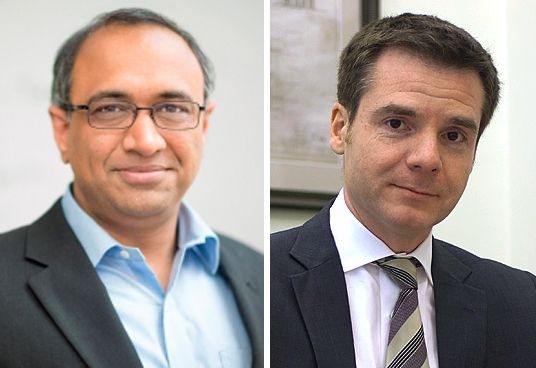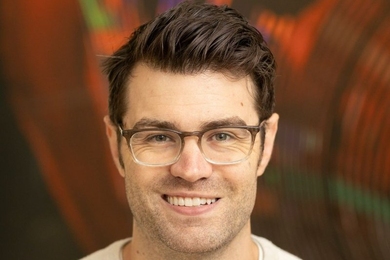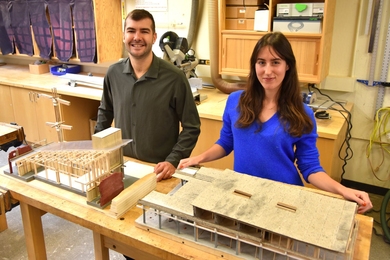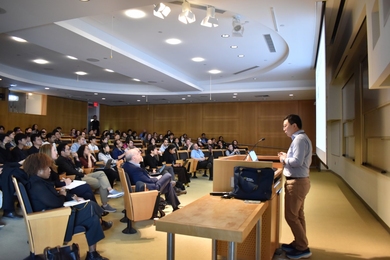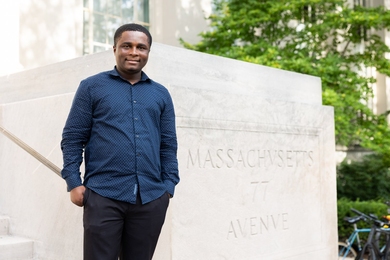President L. Rafael Reif has announced the creation of an Institute-Wide Task Force on the Future of MIT Education, saying that the stunning rise of online learning may “offer us the historic opportunity to reinvent the residential campus model and perhaps redefine education altogether.”
In an email message today to the MIT community, Reif said that he has charged the panel — to be co-chaired by Professor Sanjay Sarma, director of digital learning, and Israel Ruiz, executive vice president and treasurer — with completing a preliminary report in approximately six months, and a final report in roughly one year. Sarma and Ruiz will select individuals from across MIT to serve on the Task Force.
Reif wrote in his charge to the Task Force that American higher education is currently in the midst of “disruptive changes,” with many students struggling to afford higher education even as colleges and universities are straining to cover the cost of providing that education. At the same time, he noted, rapid advances in online teaching are making it feasible to offer highly effective instruction to millions of learners at comparatively low cost — wherever in the world those individuals are located.
“The positive implications for society are immense and impossible to fully foresee,” Reif said. “And I am convinced that these forces offer us the historic opportunity to reinvent the residential campus model and perhaps redefine education altogether. Our society can only benefit if we improve what the residential research university does better than any other institution: incubate brilliant young talent, and create the new knowledge and innovation that enrich our society and drive economic growth.”
Reif said that MIT has already chosen to help lead one aspect of this educational revolution through edX and MITx: democratizing access to university-level instruction for learners around the world. But, he added, for MIT — an institution steeped in the kind of hands-on, team-focused education that depends on community and human contact — the rise of online learning poses both a challenge and an opportunity.
“In short, to stay true to our educational values, we must seize the opportunity to reimagine what we do and how we do it,” Reif wrote, repeating a challenge from his Sept. 21 inaugural address. “In the four months since [then], the stunning pace of change has proved that we are in the midst of an educational revolution.”
Reif said he hopes that the Institute-Wide Task Force on the Future of MIT Education will not only define MIT’s own path, but will point the way toward a new, financially sustainable model.
“With the creation of MITx and then edX, MIT has taken substantial steps over the past year to open our classrooms to learners around the world,” says Sarma, who is the Fred Fort Flowers and Daniel Fort Flowers Professor of Mechanical Engineering. “But online tools also have great potential to reshape residential education. Our next step is to ascertain how all that we are learning from the world, via MITx and edX, can come back to benefit our own campus community.”
“Today, we have before us not only an extraordinary opportunity to explore new possibilities for an MIT education, but also an occasion to rethink our economic model for the future,” Ruiz adds.
MIT has long brought an iconoclastic approach to pedagogy: The Institute’s very founding, in 1861, shook American academia by reimagining college as a place for learning by doing. In the 1950s, MIT rebuilt its engineering curriculum on a foundation of basic science. Two decades later, MIT made undergraduate research central to its curriculum, an approach that has since been widely emulated; in the 1980s, with Project Athena, MIT created a prototype of today’s connected campuses. In 2002, MIT launched OpenCourseWare, an unprecedented experiment in free online sharing.
In addition to reaching out across MIT to staff the Task Force, Sarma and Ruiz will establish a mechanism, such as an “Idea Bank,” designed to enable the entire MIT community to contribute ideas. Reif has also asked Sarma and Ruiz to offer transparency in the Task Force’s operations and regular communications about its progress.
In an email message today to the MIT community, Reif said that he has charged the panel — to be co-chaired by Professor Sanjay Sarma, director of digital learning, and Israel Ruiz, executive vice president and treasurer — with completing a preliminary report in approximately six months, and a final report in roughly one year. Sarma and Ruiz will select individuals from across MIT to serve on the Task Force.
Reif wrote in his charge to the Task Force that American higher education is currently in the midst of “disruptive changes,” with many students struggling to afford higher education even as colleges and universities are straining to cover the cost of providing that education. At the same time, he noted, rapid advances in online teaching are making it feasible to offer highly effective instruction to millions of learners at comparatively low cost — wherever in the world those individuals are located.
“The positive implications for society are immense and impossible to fully foresee,” Reif said. “And I am convinced that these forces offer us the historic opportunity to reinvent the residential campus model and perhaps redefine education altogether. Our society can only benefit if we improve what the residential research university does better than any other institution: incubate brilliant young talent, and create the new knowledge and innovation that enrich our society and drive economic growth.”
Reif said that MIT has already chosen to help lead one aspect of this educational revolution through edX and MITx: democratizing access to university-level instruction for learners around the world. But, he added, for MIT — an institution steeped in the kind of hands-on, team-focused education that depends on community and human contact — the rise of online learning poses both a challenge and an opportunity.
“In short, to stay true to our educational values, we must seize the opportunity to reimagine what we do and how we do it,” Reif wrote, repeating a challenge from his Sept. 21 inaugural address. “In the four months since [then], the stunning pace of change has proved that we are in the midst of an educational revolution.”
Reif said he hopes that the Institute-Wide Task Force on the Future of MIT Education will not only define MIT’s own path, but will point the way toward a new, financially sustainable model.
“With the creation of MITx and then edX, MIT has taken substantial steps over the past year to open our classrooms to learners around the world,” says Sarma, who is the Fred Fort Flowers and Daniel Fort Flowers Professor of Mechanical Engineering. “But online tools also have great potential to reshape residential education. Our next step is to ascertain how all that we are learning from the world, via MITx and edX, can come back to benefit our own campus community.”
“Today, we have before us not only an extraordinary opportunity to explore new possibilities for an MIT education, but also an occasion to rethink our economic model for the future,” Ruiz adds.
MIT has long brought an iconoclastic approach to pedagogy: The Institute’s very founding, in 1861, shook American academia by reimagining college as a place for learning by doing. In the 1950s, MIT rebuilt its engineering curriculum on a foundation of basic science. Two decades later, MIT made undergraduate research central to its curriculum, an approach that has since been widely emulated; in the 1980s, with Project Athena, MIT created a prototype of today’s connected campuses. In 2002, MIT launched OpenCourseWare, an unprecedented experiment in free online sharing.
In addition to reaching out across MIT to staff the Task Force, Sarma and Ruiz will establish a mechanism, such as an “Idea Bank,” designed to enable the entire MIT community to contribute ideas. Reif has also asked Sarma and Ruiz to offer transparency in the Task Force’s operations and regular communications about its progress.
